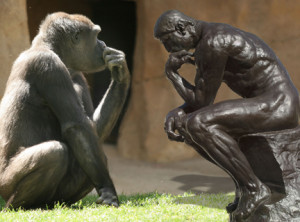 Evolutionary psychology is one of the most interesting theories to come out of Charles Darwin’s discovery of evolution. Like evolutionary physiology, it’s an attempt to explain human nature as the result of adaptations to the environment through natural and sexual selection.
Evolutionary psychology is one of the most interesting theories to come out of Charles Darwin’s discovery of evolution. Like evolutionary physiology, it’s an attempt to explain human nature as the result of adaptations to the environment through natural and sexual selection.
In evolutionary physiology, researchers trace the development of the modular parts of human anatomy as they may have evolved to solve problems in our habitation of the environment. For example, our hearts evolved to pump blood throughout our bodies, becoming bigger as we grew from our original tree-dwelling form to our current elongated form.
Similarities With Evolutionary Physiology
The key idea is that the various parts of our bodies developed in a modular way to independently meet different environmental needs. Evolutionary psychologists study the evolution of our brains in a similar way; they theorize that our behavior is the result of natural selection of the most successful members of our species. For example, people with DNA that programmed them to choose mates based on health and intelligence were evolutionarily more successful than people without these genes. Similarly, people genetically predisposed to make a lifelong parental investment in their offspring raised children that had more success than people without this predisposition.
Many of these theories are unprovable because scientists lack the technology to verify how the human brain evolved. Some assumptions, such as the modularity of cognitive faculties, aren’t based on evidence, so many critics are skeptical of the results of this research. However, many of the theories that come from evolutionary psychology are useful in a wide range of fields, including healthcare, economics, business and politics. Some findings are controversial because they have questionable political, social and ethical implications. For example, EP has been criticized for potentially supporting the idea of social classes, with certain groups of people better adapted to their environment than others. Critics have also raised questions about racial and gender discrimination in the research conducted by evolutionary psychologists.
Objections to EP Research
These critics haven’t accused researchers of racism, but they have fundamental moral objections to the idea that human behavior is rooted in biology. The argument against EP is that it attempts to explain the current state of our society as though our problems can’t be corrected through policy and education. Although EP is based on many theories that can’t be tested, it is an active area of research and produces many compelling results. Some human characteristics explained by this discipline include the natural ability of infants to learn language, to laugh and to cry, the ability of people to pay attention at will and the ability to read and write.
As with anatomy, psychological adaptations are explained in terms of variation and re-purposing. Just as the shapes of our belly buttons evolved to have random variation with no evolutionary purpose, our voices have evolved to have variations in pitch within each gender. Our small inner-ear bones evolved for a different reason than their current purpose, which is to vibrate and create sound, just as our ability to concentrate on intellectual tasks evolved before humans did any mental labor.
Charles Darwin’s theory of evolution was an eye-opening discovery that gave people a completely new perspective of their origins. Related theories such as sexual selection and evolutionary psychology attempt to go one step further by explaining our current state of existence in greater detail.
You may also like this Infographic:






